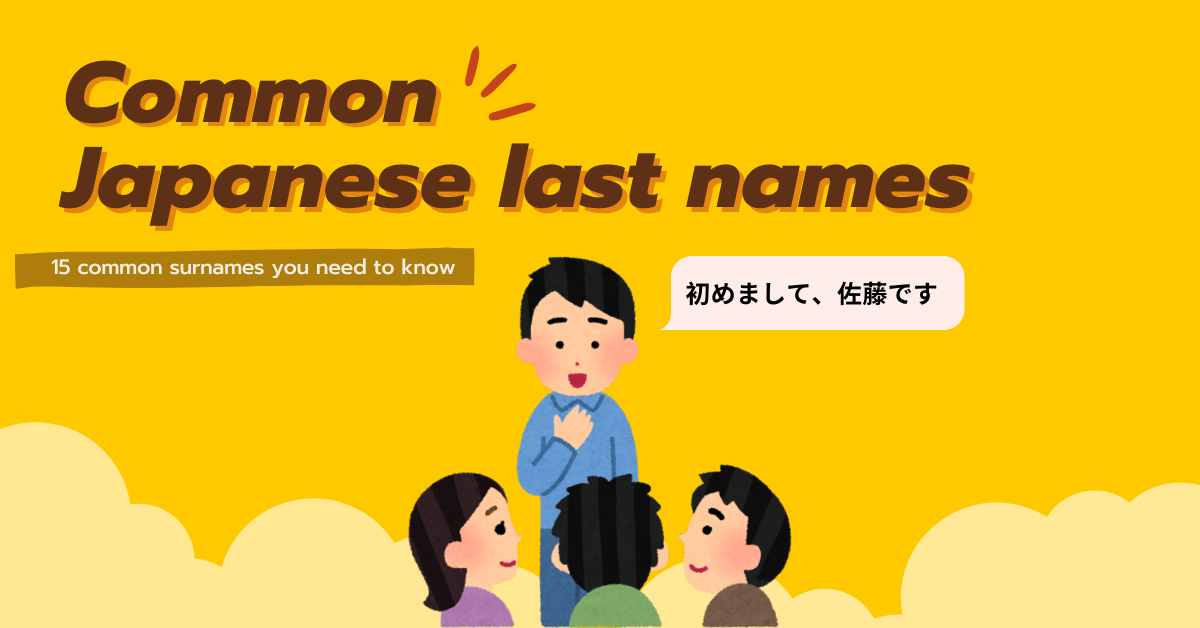Japanese last names often carry significant meanings and historical or geographical relevance. Here are fifteen common Japanese surnames along with their meanings:
Common japanese last names
- Sato (佐藤) – This name means “help wisteria,” and is one of the most common surnames in Japan.
- Suzuki (鈴木) – Meaning “bell tree,” it’s another widespread surname.
- Takahashi (高橋) – Translates to “high bridge.”
- Tanaka (田中) – Means “in the middle of the field” or “rice field center.”
- Watanabe (渡辺) – Means “cross boundary.”
- Ito (伊藤) – This common name means “that wisteria.”
- Yamamoto (山本) – Means “base of the mountain.”
- Nakamura (中村) – Translates to “middle village.”
- Kobayashi (小林) – Means “small forest.”
- Kato (加藤) – This name means “add wisteria.”
- Yoshida (吉田) – Means “lucky field.”
- Yamada (山田) – Translates to “mountain field.”
- Sasaki (佐々木) – Means “help tree.”
- Yamaguchi (山口) – Means “mountain mouth.”
- Matsumoto (松本) – Translates to “base of the pine.”

How do Japanese call each other’s names?
In Japan, addressing someone by their last name followed by an honorific suffix is the norm, especially in formal settings.
The most common suffix is -san, which is a general respectful title used irrespective of gender or marital status. In more familiar or informal contexts, first names or nicknames might be used, often among close friends or younger people.
How do Japanese people name children?
Japanese naming conventions for children are influenced by various factors including family traditions, the meanings of names, and often, the positive values parents wish to pass onto their children. Names can be inspired by nature, virtues, or aspirations. Parents usually select the kanji characters for a child’s name based on the characters’ meanings and the number of strokes, as certain stroke counts are believed to bring good luck.
The process of naming and the selection of surnames underscore the depth and cultural richness embedded in Japanese naming traditions. Understanding these can provide a fascinating glimpse into the values and social norms of Japanese society.

MochiKanji’s N5 Kanji and vocabulary course is designed for beginners looking to build a strong foundation in Japanese. The course covers essential Kanji characters and vocabulary through interactive flashcards, detailed stroke order guides, and contextual examples. With the Golden Time feature, you’ll review key terms at optimal intervals, ensuring better retention.
Start your free trial now!
FAQs
What are the rarest Japanese last names?
Some of the rarest Japanese last names include:
- Ootake (大竹): A rare surname meaning “big bamboo,” which is uncommon in Japan.
- Tachibana (橘): Although historically significant, it’s less common today. It means “tangerine” and is associated with old aristocratic families.
- Kashiwagi (柏木): Meaning “oak tree,” this name is rare and often found in historical contexts.
What are very old Japanese surnames?
Very old Japanese surnames often have historical or noble roots. Some examples are:
- Minamoto (源): This surname is associated with the Minamoto clan, a powerful family in Japanese history.
- Taira (平): Linked to the Taira clan, another significant family in historical Japan.
- Fujiwara (藤原): A surname associated with a prominent aristocratic family that had considerable influence in ancient Japan.
What is a typical Japanese last name?
A typical Japanese last name includes:
- Sato (佐藤): One of the most common surnames in Japan. It combines the characters for “help” (佐) and “wisteria” (藤).
- Suzuki (鈴木): Another common surname meaning “bell tree,” which is widespread across Japan.
- Takahashi (高橋): Meaning “tall bridge,” this surname is also quite common and typical.
What is a royal Japanese last name?
Royal Japanese last names are generally associated with the imperial family and historical nobility:
- Naruhito (徳仁): The current emperor’s name, reflecting his royal status.
- Fushimi (伏見): A surname associated with a branch of the imperial family, historically significant.
- Asakura (朝倉): Historically linked to the Asakura clan, which had noble status in certain periods of Japanese history.






